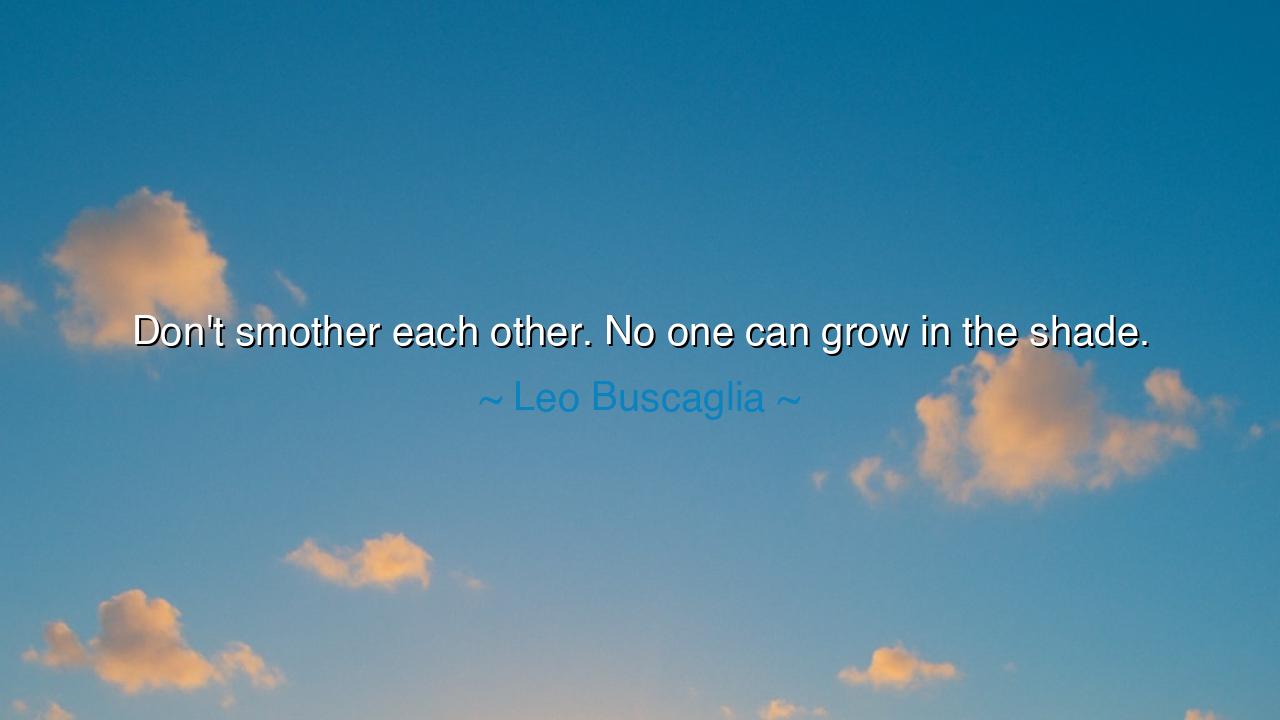
Don't smother each other. No one can grow in the shade.






Hearken, O seekers of the heart’s wisdom, to the words of Leo Buscaglia, the teacher of human connection: "Don't smother each other. No one can grow in the shade." In this utterance lies the ancient truth that love, though tender and fervent, must never constrain the spirit. True affection nurtures, uplifts, and grants the freedom for the soul to flourish, rather than enshroud it in suffocating care.
In the theater of human bonds, it is common for devotion to become overbearing, for love to transform into possession. Buscaglia reminds us that the shadow of smothering stifles growth, and that the heart, like the seed, requires space, sunlight, and air to realize its full potential. To cling too tightly is to impede the very life one wishes to nourish, for freedom is the soil in which authentic connection thrives.
The ancients, who revered the balance of attachment and liberation, knew well that growth demands autonomy. A tree planted too close to another, its leaves intertwined and roots compressed, will never reach the heights of its stature. So too the spirit: each soul must have room to explore, to stumble, to ascend, while remaining in the warmth of mutual respect and care.
Yet this teaching carries subtle depth: to love wisely is not to withdraw, but to cultivate presence without control, support without dominance. True love illuminates, inspires, and strengthens; it neither suffocates nor shadows. In granting freedom, one affirms the dignity and vitality of the beloved, and in doing so, the bond itself grows stronger, more resilient, more enduring.
Therefore, O children of the heart, let this teaching lodge in your hearts: do not smother those you cherish, for the soul cannot thrive in confinement. The love that fosters growth is generous, patient, and illuminating, offering space for discovery, for self-realization, and for the blossoming of the spirit. In such love, each heart rises toward its full light, and the bond between them becomes a sanctuary of freedom and flourishing.






KNLe Nguyen Khanh Ngoc
The idea that growth requires space is so important. In many relationships, we forget that independence is key to both partners thriving. But how do we stop ourselves from over-pressuring our loved ones to always be there for us? Can we learn to love them better by trusting them to grow on their own terms? This quote reminds us that nurturing growth means letting go sometimes, which can be hard to do.
QCNgo quynh Cao
Buscaglia’s quote hits on something powerful: independence. It’s easy to fall into the trap of thinking that being constantly close to someone is the best way to nurture them, but maybe growth requires a little bit of distance. I wonder if the best relationships are those where both people allow each other to flourish, not just as a couple, but as individuals. How do we find that perfect balance?
QANguyen Quynh Anh
I think there’s a deep truth in this quote. It’s about recognizing that each person needs to thrive individually to bring their best self to the relationship. But how do we differentiate between giving space and becoming distant? Sometimes, giving too much space can feel like neglect. What do you think—can someone truly grow in a relationship if there’s no balance of closeness and freedom?
LDLong Le Dang
Leo Buscaglia's words remind me of how relationships, whether romantic or platonic, can sometimes become overwhelming when too much attention is given. Isn’t it true that when we try to control someone’s growth, we inadvertently stunt it? I wonder, how do we know when to step back in a relationship? Are we often afraid of being too distant, or is it healthy to allow that kind of space for growth?
PHphuong huyen
This quote really speaks to me about the importance of space in relationships. It’s easy to think that showing love means being constantly present or involved, but sometimes, people need room to grow on their own. Do you think it’s possible to love someone without trying to control them? How do we strike the balance between being supportive and allowing the freedom for personal growth?